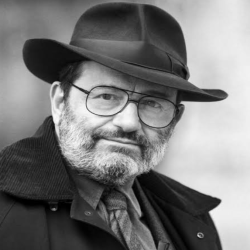
Umberto Eco
| Date of Birth | : | 05 Jan, 1932 |
| Date of Death | : | 19 Feb, 2016 |
| Place of Birth | : | Alessandria, Italy |
| Profession | : | Author, Novelist, Educationalist |
| Nationality | : | Italian |
Umberto Eco OMRI was an Italian medievalist, philosopher, semiotician, novelist, cultural critic, and political and social commentator.
Biogrphy
After receiving a Ph.D. from the University of Turin (1954), Eco worked as a cultural editor for Italian Radio-Television and lectured at the University of Turin (1956–64). He then taught in Florence and Milan and finally, in 1971, assumed a professorial post at the University of Bologna. His initial studies and researches were in aesthetics, his principal work in that area being Opera aperta (1962; rev. ed. 1972, 1976; The Open Work), which suggests that in much modern music, Symbolist verse, and literature of controlled disorder (Franz Kafka, James Joyce) the messages are fundamentally ambiguous and invite the audience to participate more actively in the interpretive and creative process. From that work he went on to explore other areas of communication and semiotics in such volumes as A Theory of Semiotics (1976) and Semiotics and the Philosophy of Language (1984), both written in English. He also published Come si fa una tesi di laurea (1977; How to Write a Thesis), a practical guide to writing and research.
Many of his prolific writings in Italian on criticism, history, and communication have been translated, including La ricerca della lingua perfetta nella cultura europea (1993; The Search for the Perfect Language) and Kant e l’ornitorinco (1997; Kant and the Platypus). He edited the illustrated companion volumes Storia della bellezza (2004; History of Beauty) and Storia della bruttezza (2007; On Ugliness), and he wrote another pictorial book, Vertigine della lista (2009; The Infinity of Lists), produced in conjunction with an exhibition he organized at the Louvre Museum, in which he investigated the Western passion for list making and accumulation. Costruire il nemico e altri scritti occasionali (2011; Inventing the Enemy, and Other Occasional Writings) collected pieces—some initially presented as lectures—on a wide range of subjects, from fascist reactions to Joyce’s Ulysses (1922) to the implications of WikiLeaks. Storia delle terre e dei luoghi leggendari (2013; The Book of Legendary Lands) investigates a variety of mythological and apocryphal settings.
The Name of the Rose—in story, a murder mystery set in a 14th-century Italian monastery but, in essence, a questioning of “truth” from theological, philosophical, scholarly, and historical perspectives—became an international best seller. A film version, directed by Jean-Jacques Annaud, appeared in 1986. Eco continued to explore the connections between fantasy and reality in another best-selling novel, Il pendolo di Foucault (1988; Foucault’s Pendulum).
L’isola del giorno prima (1995; The Island of the Day Before) uses fictional epistolary fragments—pieced together with narration by Eco himself—to trace the peregrinations of a 17th-century Italian nobleman who is drawn into the search for a means of measuring longitude. The illustrated novel La misteriosa fiamma della regina Loana (2004; The Mysterious Flame of Queen Loana) traces the efforts of a book dealer to reconstruct his life—having suffered amnesia following a coma—through reviewing literature and periodicals from his youth. Il cimitero di Praga (2010; The Prague Cemetery) fictionalizes the creation of the Protocols of the Learned Elders of Zion, a fraudulent document that was purported to be a plan for Jewish world domination and was used to countenance anti-Semitism. Numero Zero (2015) concerns a journalist hired to work for a mysterious propaganda publication. Pape Satàn aleppe, a collection of Eco’s columns for an Italian magazine, was published posthumously in 2016; its title is taken from a cryptic line in Dante’s The Divine Comedy.
Personal Life and Death
In September 1962 he married Renate Ramge , a German graphic designer and art teacher with whom he had a son and a daughter. Eco divided his time between an apartment in Milan and a vacation house near Urbino. He had a 30,000-volume library in the former and a 20,000-volume library in the latter.
Eco died at his Milanese home of pancreatic cancer, from which he had been suffering for two years, on the night of 19 February 2016. From 2008 to the time of his death at the age of 84, he was a professor emeritus at the University of Bologna, where he had taught since 1971.
Quotes
To survive, you must tell stories.
All the blogs, Facebook, Twitter are made by people who want to show their own private affairs at the price of making fakes, to try to appear such as they are not, to construct another personality, which is a veritable loss of identity.
I believe that what we become depends on what our fathers teach us at odd moments, when they aren't trying to teach us. We are formed by little scraps of wisdom.
I have come to believe that the whole world is an enigma, a harmless enigma that is made terrible by our own mad attempt to interpret it as though it had an underlying truth.
Poetry is not a matter of feelings, it is a matter of language. It is language which creates feelings.
Never affirm, always allude: allusions are made to test the spirit and probe the heart.
Love is wiser than wisdom.
The function of memory is not only to preserve, but also to throw away. If you remembered everything from your entire life, you would be sick.
What is life if not the shadow of a fleeting dream?
Originality and creativity are nothing but the result of the wise management of combinations. The creative genius combines more rapidly, and with a greater critical sense of what gets tossed out and what gets saved, the same material that the failed genius has to work with.
